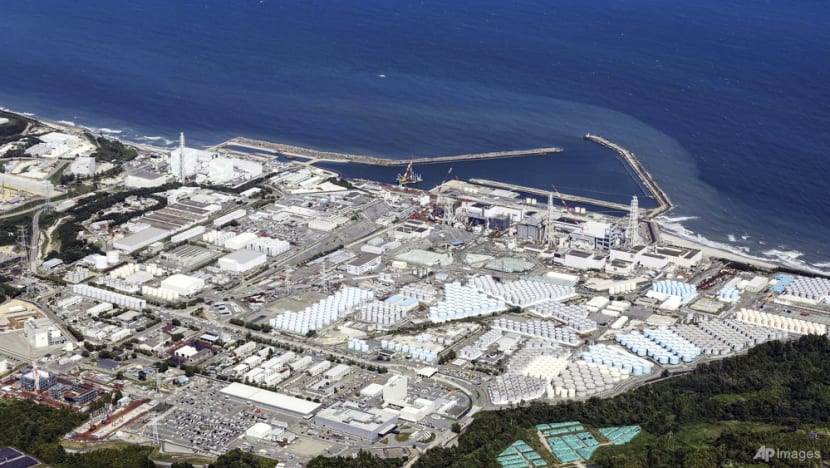Fukushima wastewater release: Malaysia to monitor Japan food imports amid rising public concerns

SINGAPORE: Amid concerns over the release of wastewater from the Fukushima nuclear plant, Malaysia said that it will closely inspect all high-risk food products imported from Japan, even as some members of the public have expressed worries over food safety issues.
In a statement on Wednesday (Aug 23), Malaysia’s Director-General of Health Dr Muhammad Radzi Bin Abu Hassan said: “The Ministry of Health will impose a Level 4 (Surveillance) inspection at the country's entry points on high-risk food products imported from Japan for the analysis of radioactive material content.”
Japan on Thursday began releasing treated wastewater from the Fukushima nuclear plant, some 12 years after one of the world’s worst nuclear accidents.
Dr Radzi had earlier said that the release of the treated wastewater is in accordance with Japanese safety standards and has received approval from the International Atomic Energy Agency (IAEA) in July.
He also sought to assure the public that Malaysia’s health ministry monitors activities at the country’s entry points and local markets to ensure that food safety is guaranteed.
According to him, following the nuclear plant explosion in Fukushima in 2011, the Ministry of Health - through the Food Safety and Quality Division - monitored food products imported from Japan from May 2011 until April 2012.
A special monitoring program was also conducted in 2019, he added.
Dr Radzi noted that based on data from the health ministry, fish and fish-based products are among the highest products imported from Japan. This is followed by fruits, vegetables and processed food and beverages with a total value of RM880,115,437 (US$190 million).
Related:
Following news that treated wastewater will be released from Fukushima into the ocean, Malaysians have expressed concerns over food safety issues, particularly over seafood imported from Japan.
Several netizens on social media platform X called for the government to ban all seafood imported from the East Asian country.
“Will sushi be more expensive after this?” asked an X user.
Another netizen pointed out that although Japan has no choice but to release the treated wastewater to the sea, it is an “unprecedented event”.
“(This) means we don't really know what exactly will happen,” she said.
Some netizens also questioned whether the treated wastewater is safe from radiation and expressed worries of falling ill.
“More and more people are quickly getting cancer and other illnesses,” said one netizen.
The public has been urged to “remain calm”, with Malaysia’s Deputy Agriculture and Food Security Minister Chan Foong Hin sharing in a Facebook post that the country does not currently import live marine fish from Japan.
He added that for non-live fishery products from Japan, his ministry is working closely with the health ministry and other government agencies to monitor food safety issue levels.
Among the things being done include checks on health certifications and radiation during post import, said Mr Chan.
Dr Akbar John - a senior lecturer from Universiti Sains Malaysia’s (USM) Environmental Tech Division of the School of Industrial Technology - told CNA that the public need not panic as long as the contaminant level of radioactive materials is within the national and international standards.
“No doubt, the implementation of Level 4 (Surveillance) inspection adopted in Malaysia’s entry points on high-risk food products especially fish and fish products imported from Japan will ensure food safety in Malaysia,” he said.
However, he noted that depending solely on inspections might not be enough to guarantee complete safety.
“A major concern is the data transparency from both Japan and neighbouring countries on the level of radioactive tritium contaminant in ‘point source’ (i.e., Japan) and any country importing marine food products,” Dr John told CNA.
“The public should be made aware of the contaminant level through the government online portal and continuous long-term monitoring will ensure public safety.”
He added that besides regular monitoring and testing and data transparency to the public, the Malaysian government could also conduct risk assessments and encourage the public to diversify food sources to reduce the reliance on imported food products.
China has since banned all Japanese seafood products following the release of the wastewater from Fukushima on Aug 24.
According to AFP, Beijing's foreign ministry branded the release as an "extremely selfish and irresponsible act", saying in a statement that the move would "push the risks onto the whole world (and) pass on the pain to future generations of human beings".
Civic groups have also launched protests in Japan and South Korea, although the South Korean government has said its own assessment found no problems with the scientific and technical aspects of the release.
Japan has maintained that the wastewater release is safe, while the IAEA said that the impact it would have on people and the environment was "negligible".
The Fukushima Daiichi plant was destroyed in March 2011 after a massive 9.0 magnitude earthquake off the Japanese coast generated powerful tsunami waves that caused the meltdowns of three of its reactors.
The wastewater release is a key step in a dauntingly long and difficult process of decommissioning the plant, including the removal of molten fuel.

















